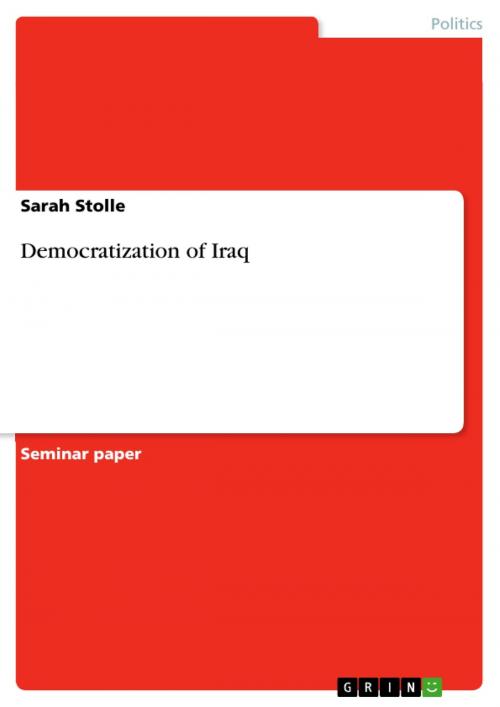Democratization of Iraq
Nonfiction, Social & Cultural Studies, Political Science, International, International Relations| Author: | Sarah Stolle | ISBN: | 9783638542043 |
| Publisher: | GRIN Publishing | Publication: | September 6, 2006 |
| Imprint: | GRIN Publishing | Language: | English |
| Author: | Sarah Stolle |
| ISBN: | 9783638542043 |
| Publisher: | GRIN Publishing |
| Publication: | September 6, 2006 |
| Imprint: | GRIN Publishing |
| Language: | English |
Seminar paper from the year 2005 in the subject Politics - International Politics - Region: Near East, Near Orient, grade: 1,0 Germany, 5 Finland, University of Tampere, 16 entries in the bibliography, language: English, abstract: The news about the Iraq seem to be always the same. In the former empire of Saddam Hussein dominates terrorism, destruction and death. Positive news of Iraq are neither in the newspaper nor in television. This inappropriates the reality. In Iraq there exist also positive occurrences. Indeed it is true that these are mostly only small successful stories for example a reopening of a school or a hospital or maybe only new medical equipment. But such events have not any space in the news. It´s seems to be to nonrelevant and these news do not represent the picture of the Iraq that the people have or want to have. Anyhow these prosperities are a step into a better future. However we also have to contemplate the Iraq with a view on the former days. There was a dictator, Saddam Hussein, a tyrant who controlled everybody, who eliminate the Schiites and Kurds, who let rape the women of his opponents, who demolished houses and at last executed thousands of people. And he did not only tyrannize his own country, he was also a big danger for the rest of the world. The first pictures after the conquest of Baghdad from the US-armed forces showed a population felt that their suffering under Saddam is over. There was a folk which celebrated the release from a brutal dictator. Also in 2005 the majority of the Iraq thinks still in the same way. There is a folk who sees a better future. 67 percent of the population have the opionion that their country will turn to a better route. Before the elections January 2005 67 percent of the population supported the elections and 88 percent reported that they will take part in the votings. At the end 58 percent of the whole population voted, which is a good result for a country which makes it´s first experiences with democratic principles. But of course it´s no question that the USA pursued a very high and difficult aim with the democratization of the Iraq and it is also beyond discussion that it will take a lot of time to democratize the Iraq, which was three years ago a dictatorship. In the following essay I would like to discuss the opportunity for the democratizationprocess in Iraq. But at first the essay begins with some aspects about the situation under the Saddam regime, because we can only appreciate the future options when we know something about the history. After this I go on with the contemporary situation in Iraq, with positive and negative aspects about the present democratization process. [...]
Seminar paper from the year 2005 in the subject Politics - International Politics - Region: Near East, Near Orient, grade: 1,0 Germany, 5 Finland, University of Tampere, 16 entries in the bibliography, language: English, abstract: The news about the Iraq seem to be always the same. In the former empire of Saddam Hussein dominates terrorism, destruction and death. Positive news of Iraq are neither in the newspaper nor in television. This inappropriates the reality. In Iraq there exist also positive occurrences. Indeed it is true that these are mostly only small successful stories for example a reopening of a school or a hospital or maybe only new medical equipment. But such events have not any space in the news. It´s seems to be to nonrelevant and these news do not represent the picture of the Iraq that the people have or want to have. Anyhow these prosperities are a step into a better future. However we also have to contemplate the Iraq with a view on the former days. There was a dictator, Saddam Hussein, a tyrant who controlled everybody, who eliminate the Schiites and Kurds, who let rape the women of his opponents, who demolished houses and at last executed thousands of people. And he did not only tyrannize his own country, he was also a big danger for the rest of the world. The first pictures after the conquest of Baghdad from the US-armed forces showed a population felt that their suffering under Saddam is over. There was a folk which celebrated the release from a brutal dictator. Also in 2005 the majority of the Iraq thinks still in the same way. There is a folk who sees a better future. 67 percent of the population have the opionion that their country will turn to a better route. Before the elections January 2005 67 percent of the population supported the elections and 88 percent reported that they will take part in the votings. At the end 58 percent of the whole population voted, which is a good result for a country which makes it´s first experiences with democratic principles. But of course it´s no question that the USA pursued a very high and difficult aim with the democratization of the Iraq and it is also beyond discussion that it will take a lot of time to democratize the Iraq, which was three years ago a dictatorship. In the following essay I would like to discuss the opportunity for the democratizationprocess in Iraq. But at first the essay begins with some aspects about the situation under the Saddam regime, because we can only appreciate the future options when we know something about the history. After this I go on with the contemporary situation in Iraq, with positive and negative aspects about the present democratization process. [...]















